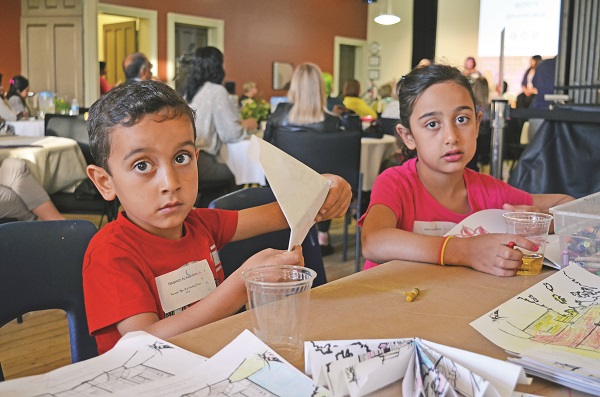General News » News
Ramadan brought message of unity and highlighting differences
July 13, 2016 · 0 Comments

By Brock Weir
Nasim Misrabi held the crowd in the palm of his hand as he grabbed his guitar and hit the stage for a moving selection of Canadian and Arabic songs.
Born of Turkish heritage, Mr. Misrabi spent a considerable amount of time in a refugee camp in Syria before getting the opportunity to come to Canada.
As he waited for his chance for a better life, he said the music of Canada kept him feeling “human.” Now, settling into his new home, he is eager to return the favour and build these human connections through song.
“I was a singer in Damascus and I got out in 2015; they made me comfortable and they made me sleep,” he said.
Last week, hundreds of Muslims and other community leaders gathered at the Lambert Willson Park baseball diamond to celebrate Eid. Earlier in the holy month of Ramadan, they converged to foster these connections at an Iftar Dinner – a fast breaking – hosted by the Intercultural Dialogue Institute of the GTA and the Aurora Cultural Centre.
Bringing together representatives of the Muslim community, and community leaders of all faiths from throughout York Region, attendees heeded Nasim’s call and, in the words of Mayor Geoff Dawe, “raised the ideals of unity, love and understanding.”
But it also served as a call to remind the community that refugees coming into York Region are not just from Syria, but from all over the world, all facing their own unique circumstances and needs.
“One thing we need to understand, along with Syrians, is we are seeing refugees coming here from other countries as well,” said Rummana Virji of the York Region District School Board. “This year, we have had up to 200 refugees come in and 62 of them were Syrian Refugees [from various countries]. We have got lots of other countries that they do come from and I think it is a very important thing to recognize and keep at the back of our minds when we’re talking about the refugee experience and the newcomer experience.
“They have been humbled by the Canadian generosity, the love, the compassion, the care that has come in from the entire Region. I have to say there was a lot of back and forth, many people who weren’t very positive about it and people who were apprehensive, but by and large, as time has gone by we have seen the Region come together, hold hands and embrace this new family we have brought into the fold in York Region.”
Ms. Virji was part of a panel discussion held before the fast-breaking, hosted by Michael Bowe of the York Region Children’s Aid Society, including Jason Hastings of the Local Immigration Partnership, Agnes Manasan of Catholic Community Services of York Region, and Naheed Yaqubian, Chair of the School Board’s Equity Inclusivity Advisory Committee.
Ms. Virji said York Region is somewhat lucky in the sense it has not been “bombarded” with families, making each individual case easier to handle, “hand-hold each one of them, take care of them, nurture them, and love them.” Through the process, she said she has seen the situation cross boundaries, nationalities, languages, and cultures.
“One thing that is very important is each family is different and each one has come with a different experience. I don’t think we can paint them with one brush. We have to understand what each one has been through and identify with them. Instead of subjecting our values, our interests, our thoughts, wishes and dreams on them, sit back and take the time to listen to each one of them.”
This was a message shared by Faith Yegul, Executive Vice President of the Intercultural Dialogue Institute, who reflected on the sadly iconic image of a young boy, drowned, face down on the beach after he and his family fled.
“This image gripped us all as we were reminded of the important story that is often not captured,” she said. “They are the experiences and the quiet voices of children and youth who are refugees and newcomers. His life and legacy makes us reflect on the common responsibility of child welfare professionals and the critical role that community agencies can have in creating supportive and understanding environments for children, youth and family as they arrive in York Region.
“It is imperative that we stop and acknowledge our obligations to understand the impact that displacement can have on children, youth and families and that we must be mindful of the lived experiences of young people and we design strategies to support newcomers to our neighbourhoods.”













